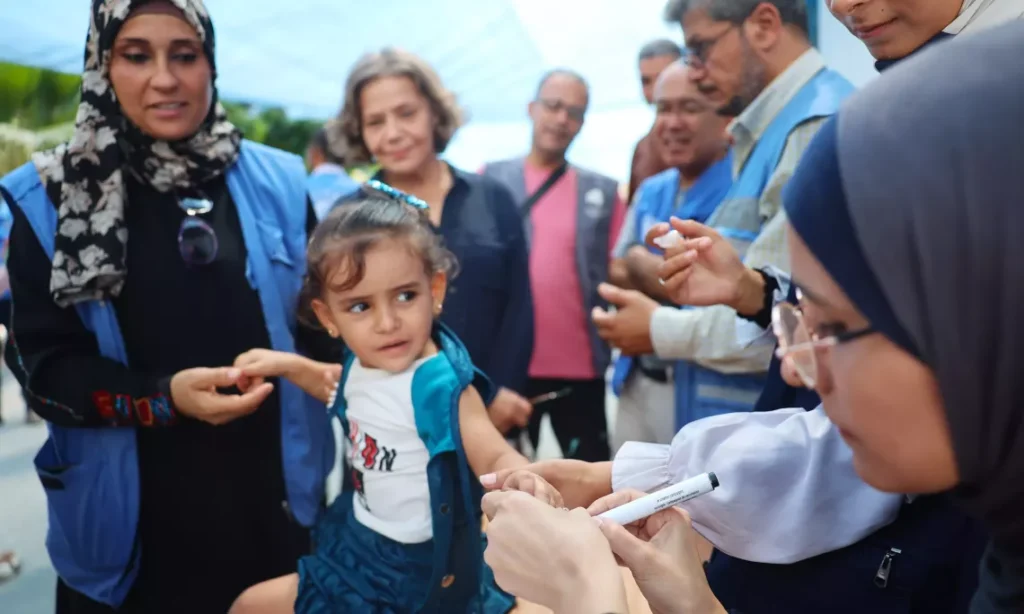
A health worker marks a child’s finger with a black pen to indicate that she has been vaccinated for polio in the Gaza Strip.
Credit: UNICEF, SoP/2024/Eyad al-Baba
In the UK it is easy for polio to feel like a thing of the past. But it is still causing paralysis and even death in far too many children around the world. Polio is a horrible disease. One in every 200 infections leads to irreversible paralysis; among those paralysed, mostly children, 5-10% die when their breathing muscles become immobilised.
We know that polio eradication is “tantalisingly close”; there is a target to end this disease by 2029. In these final stages, we cannot rest on our laurels. This World Polio Day (24 October), it’s important to remember that we are not just fighting to eradicate polio, but also to stop it coming back.
A huge factor in the progress made so far against polio is the Global Polio Eradication Initiative (GPEI). When the GPEI started, polio paralysed more than 1,000 children worldwide every day. Since then, over 2.5 billion children have been immunised against the disease and now, polio is now endemic in just two countries, Pakistan and Afghanistan.
Yet, until transmission of the virus is interrupted completely, all countries remain at risk of importing polio. If vaccination rates fall or conditions deteriorate such as after extreme weather events or in conflict situations, even countries where polio has not been present for many years can experience a resurgence.
Last year, grassroots campaigners wrote to their MPs to ask for continued UK support for polio eradication, after a 10 month old baby contracted polio in Gaza. This was the first case in Gaza in 25 years and was likely the result of sewage contaminated water following Israel’s destructive bombing campaign. UNICEF, one of GPEI’s founding partners, recently produced a very powerful short film about the three vaccination campaigns that were run in Gaza.
Polio is a highly infectious disease that can spread quickly, which is why the urgent vaccination campaigns that GPEI runs in response to outbreaks are so critical. They are only possible because GPEI partners had funding to both detect and identify the polio cases and then run the vaccination campaigns. To end polio, we need to make sure it doesn’t come back in places of conflict – adding to the horrors already being experienced by people like those in Gaza. Fully supporting the GPEI in its work is an easy and effective way for the UK Government to do this.
Another factor affecting the fight against polio is climate change.
Madagascar was declared free of wild polio in 2018, but between 2020 and 2023, it experienced an outbreak of variant polio. This happens when children vaccinated with oral vaccines shed a weakened strain of the virus in their faeces, which can then circulate among under-immunised and unimmunised people until it slowly mutates into a form causing paralysis. This is a particular problem in countries where health systems are weak, immunisation programmes are patchy, and clean water is scarce. At the outbreak’s peak in September 2023, a total of 287 cases had been confirmed.
Each child needs to be vaccinated at least twice for it to be effective. To prevent outbreaks of variant polio, it is important that all children in a community receive the vaccine and that they get all of the doses. In an area with poor sanitation and contaminated water, polio can spread from those who have received one dose to other children who have received none. Record keeping, which might sound like a luxury, is critical when failure to vaccinate the whole community can lead to re-infections.
The government and GPEI partners responded quickly in Madagascar, launching seven nationwide vaccination campaigns including both children and adults, overcoming numerous challenges. The vaccines needed to reach incredibly remote communities with the correct types of storage so that they could be safely and effectively used. Trained community health workers were needed to administer the vaccines, and keep records of the children in a community who had received a vaccine, with the trust of the local community.
In total, during the course of these campaigns, 19 million people were vaccinated, and a vaccination rate of 95% was achieved. Thankfully, Madagascar hasn’t had any polio cases since September 2023, and the outbreak was officially declared over in May 2025.
Eradicating polio needs political will, both in donor countries to prioritise funding, and in countries experiencing outbreaks. The outbreak in Madagascar was tackled successfully because the national and local governments were involved in designing and implementing the vaccination campaigns. It also needs hope – something that comes across so powerfully in the UNICEF film. In Gaza, they were able to run the vaccination campaigns despite the border check points being closed and bombings disrupting the humanitarian pauses that were in place. The polio workers in Gaza found hope in doing what they can. We must do the same.
Diseases do not respect borders, and none of us are safe until everyone is safe. Supporting the eradication of polio is both the morally right thing to do and in our national self interest. This is why the UK continuing to support polio eradication is so critical.